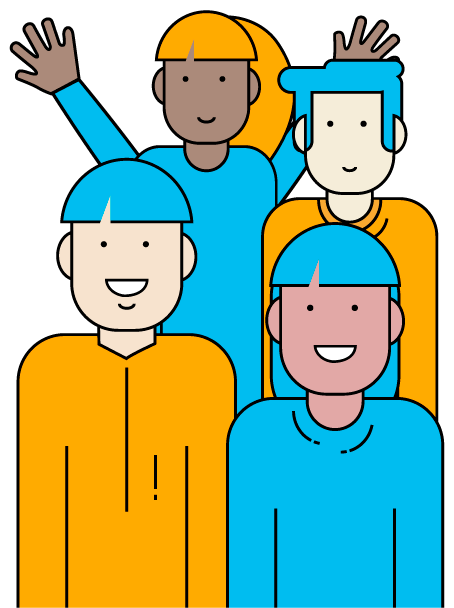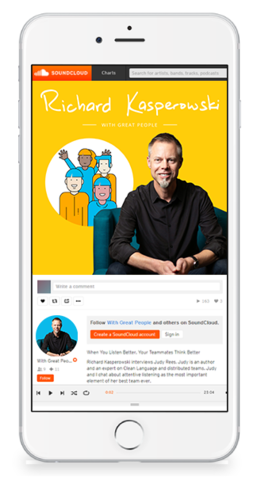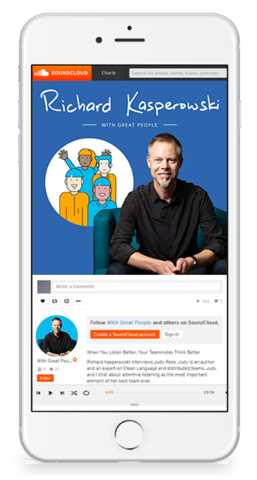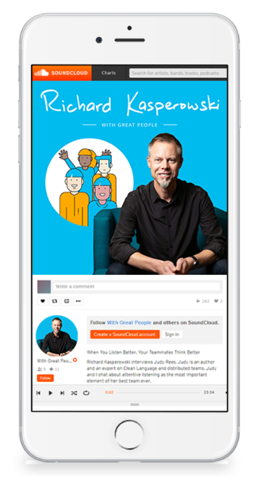Categories
Michael de la Maza: Use the Friction to Get Your Team to the Top
In this episode, Richard interviews Michael de la Maza, a well known Agile and Scrum Coach and Consultant from the Bay Area. Michael is a founder of the Heart Healthy Scrum, an Agile and Scrum consultancy firm. He is a co-author of Why Agile Works: The Values Behind the Results and Agile Coaching: Wisdom from Practitioners. Michael challenges the notion that a successful team must always be a harmonious unit filled with friendly and compassionate people. While positive bias, a supportive environment, and empathy are indispensable ingredients for a team’s success, frictions inevitably occur. Michael tells us how discipline and consistent team introspection can turn the friction into an unstoppable creative force. When you finish listening to the episode, connect with Michael on LinkedIn, and visit his website at https://www.hearthealthyscrum.com.
Listen Audio
Michael de la Maza: Use the Friction to Get Your Team to the Top
with Michael de la Maza


Watch video
TRANSCRIPT
Richard 00:11:
Hi friends. Welcome back to With Great People, the podcast for high-performance teams. I’m Richard Kasperowski. Our special guest today is Michael De la Maza. Michael is an agile coach in San Francisco. To support this podcast, visit my website, kasperowski.com.
Richard:
Hey Michael, how are you?
Michael:
I’m doing very well. Thanks for having me on your show.
Richard:
You’re welcome. It’s really just nice to see you and nice to get to hang out with each other for a little while. I’m grateful that you can be here with me. What else could you add on to that introduction? What else could people know about you?
Michael:
So I’ve been an agile coach for 10 years. I’m independent. First, I started off in Boston and then now I’m in San Francisco and I’ve worked with everything from 80 person startups to 30,000 person, fortune 500 companies.
Richard:
And so cool. Has it really been 10 years?
Michael:
It has been 10 years and I think it might actually be more because I was an independent agile coach for 10 years. But you and I met in 2007, 2006, thereabouts.
Richard:
Something like that, yeah. And you were doing it back then as well?
Michael:
Yes, I was doing that back then as a full-time employee director of software development.
Richard:
Got it, got it, got it. Yeah, I was thinking about… I don’t know. I think it was the first time I met you. You were doing, like we colloquially always say a talk, but it wasn’t a talk. It was an interactive, fun, agile games learning experience. And I didn’t know you, but you were at that moment in time. I was coming up to speed on agile. You were the man, you were on stage, so to speak on stage, there wasn’t a stage, but you were in the front of the room and you were guiding us through all these amazing learning activities. It was my first true experience with playful learning activities. And it really blew me away and it really inspired me and I was so glad that we got to work together after that.
Michael:
Phenomenal. I’m glad to hear it had that impact on you.
Richard:
So this is the podcast about teams, high-performance teams, best teams of our lives. What is the best team that you were ever a member of? Best team that you were part of in your life? And this is any kind of team, work team, a non-work team, musical group, anything. What’s the best group of people that you’ve ever been a part of in your life?
Michael:
Yeah. So the best team I’ve ever been a part of life was a debate team that I was on when I was in high school. And then we went from being relatively unknown to being one of the top 10 in the country after a couple of years.
Richard:
Okay, relatively on down to top 10 in the country. That is really cool. So that’s a quantitative measure that this was a great team. One of the top 10 in the country, any other quantitative measures or qualitative ideas, the sensation of being part of that team?
Michael:
Yeah. So quantitatively betas is organized in the form of tournaments and there might be, say, six debates in a tournament. And then you go to quarter finals, semi-finals and finals and we won a lot of tournaments. California type of tournament, it’s a very large state type of tournaments. And then one of the things personally or qualitatively is that I think that many people think of great teams as being very positive and upbeat and everyone is being very kind and compassionate all of the time. And this team was definitely not like that. So this team, there was a competitive aspect towards it, where people were really calling on each other and saying, this doesn’t work and we need to get better at this. So there was some degree of spiciness and friction in the climb to the top
Richard:
All right, spiciness and friction in the climb to the top. So you’re right. Sometimes people… I’ve written about this a couple of times, I love talking about this with people. Sometimes people think that the best team it’s all positive. Even I talk about positive bias and people think it’s always positive. There’s never anything negative, but we’ve got an example here of what you’re telling each other, what’s wrong and… How did that go? Can you remember that far back? What was an example of somebody being spicy saying something was wrong and we want to be better at it.
Michael:
So an extreme example of it was teammates. So this is Oxford debate. So inside of the big team, the high school team, there are two person debate teams. And so, who you work with as a partner really matters a lot. And so, if someone say, decides to take off this summer, like one of my debate partners did my original debate partner, then switching as an option. And that’s not a great conversation to have worked with someone fairly closely for a year or two, then they decide to take the summer off. And what typically happens during the summer is like for the entire year is known. And so the summer is the time to accelerate and start doing research and getting prepared for the next year’s debate season. And so, if someone takes the summer off, that’s losing three months of time.
Richard:
Okay.
Michael:
And so there was an enormous amount of friction and disappointment in switching teams.
Richard:
I’m curious. Were you on the side of took the summer off or did not take the summer off?
Michael:
You’re not taking the summer off.
Richard:
Okay. And so you had this experience of finding a new partner?
Michael:
Yes, I have the experience of finding a new partner and telling my original partner, what is it that you want to do and say. Well, I need to make a decision here about what I want to do. And it just so happened that the top debate team at that time, that two person debate team was splitting up because the senior member of the team was graduating and going to college. And so, the remaining member was looking for a partner. And so I became his partner.
Richard:
All right. So worked out for the two of you. When you go back to that, when we’re talking about debate team, are we talking about the bigger team or one of these two person pairs?
Michael:
So we’re talking about the bigger team.
Richard:
And so the bigger team, if you took yourself back to it mentally. If we went back in time and you’ve heard me say this before, as a guided meditation, almost if we closed our eyes and took ourselves back there to Michael Lila Mutha in high school and the debate team, and you got to re-experience having that group of people around you and doing all of the activities related to that team. What’s one word that you would use. What is the one word that you could use to summarize the sensation of being with that team, that group of people, doing that activity.
Michael:
Discipline.
Richard:
Discipline? And what does discipline mean here?
Michael:
So discipline means practicing a lot, four hours every week. It means coming to a debate tournament prepared. There was a lot of travel. And so a standard thing that a 15 year old or a 17 year old does when they’re traveling and they’re away from their parents is to stay up all night. And so that guarantees a bad tournament. And so I learned a rule very early on, which is don’t turn on the TV. And so not turning it on the TV really served me well as a traveling agile coach as well, because turning on the TV is one of the worst things I can do when I’m on a client site. And so that takes discipline… practicing every week takes discipline because homework would steam to take a priority, but then it needs to get done. And then there needs to be time leftover for debate.
Richard:
Yeah. All right, discipline. Okay. So one of these behaviors of discipline is not turning on the TV. What are some other concrete behaviors that went into this debate team success?
Michael:
Yeah. So one is, doing the work when the feedback is unclear. So a simple example of that is, we lose a debate and then we analyze why we lost it. And what arguments did we lose? What piece of data did we not have? And it’s so easy in that moment to say, it’s extremely unlikely that we’re going to encounter this situation ever again, which is actually true. There might be dozens and dozens of variants, and it’s extremely unlikely that we’ll encounter that part. So why not just mail it in and not do that work? And so that’s another example of discipline.
Richard:
Okay. It sounds like you got your foundation in agile back when you were in high school.
Michael:
Well, in retrospect, I think that’s accurate. I didn’t know that at that time, obviously, that these things would help with say retrospectives, for example.
Richard:
Yeah, exactly. And I think we both know from our experience, that seems like the best work teams are the ones that have this discipline right to do these retrospectives, to look back, to figure out what went wrong, even if it was one time and they think it would never happen again.
Michael:
That’s right.
Richard:
So how about advice for listeners? So it’s our first time recording with video. Advice for viewers, advice for anybody enjoying this podcasts. What could they take from your experience? What would you recommend that they take and put it into their team?
Michael:
What I recommend that you take is to really know yourself as well as possible and to have some idea of what your personal likes and dislikes are, and to be sort of very honest about it. So here’s a simple exercise that I like to do with myself, which is just to look at all of the activities that I’m doing during a day, during the week, and find out which things are giving me energy and which things are subtracting energy. I’d like to do this by myself because it’s a secret almost. I don’t like interacting with this particular teammate. I don’t like having conversations with… about contracts. I don’t like doing accounts receivable. I don’t like doing Tai Chi and have a very, very explicit sense of what I like and what I don’t like. The idea of let’s take the things that I like and make them my full time job.
Richard:
What might that look like on a work team?
Michael:
So on a work team, I’m a fan of doing this individually.
Richard:
Okay.
Michael:
And then saying to other people, and this requires a high degree of trust. Here’s what I need from you or what I would benefit. So I could say, Rich should we have this 30 minute meeting every week. I’ve discovered that I don’t really like that 30 minute meeting. What I would love to have from you is an alternative way of doing that meeting. Can we brainstorm different ways? Can we do it on Slack? Can we do it on Email? And it’s a request, it’s not a demand. And it’s something that you can say no to or improve as you like.
Richard:
Yep. All right. Nice. Is there anything else you’d like to add? Anything you’re working on, you want to share. Any advice for other teams, anything at all?
Michael:
One thing I want to emphasize to everyone on the audience is that an agile is for real, it’s been on the cover of Harvard business review a couple of times in the last year and a half or so. It is not a fad. It is now becoming a serious part of what essentially a Silicon Valley company that I work with does. And so be confident that agile is going to be around for a very long time and that you can make a career out of it.
Richard:
All right. Thanks. And how could listeners get in touch with you?
Michael:
The easiest way is on LinkedIn. I have a very distinctive name, so it’s easy to find me. So find me via my website which is, hearthealthyscrum.com. a one word.
Richard:
All right. And we’ll put links to that in the podcast notes. People can find it even more easily. Well, Michael, thanks so much for joining us today. It was really awesome catching up. Thank you.
Michael:
You’re welcome. It’s a pleasure.
Richard:
And dear listeners, remember to support this podcast, visit my website. kasperowski.com.





